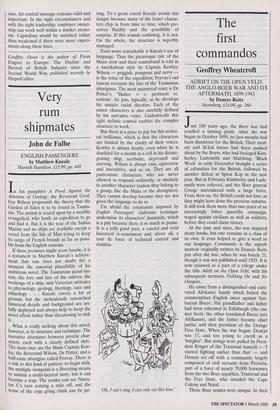Very rum shipmates
John de Falbe
ENGLISH PASSENGERS by Matthew Kneale Hamish Hamilton, £15.99, pp. 448 In his pamphlet A Proof Against the Atheisms of Geology, the Reverend Geof- frey Wilson propounds the theory that the Garden of Eden is to be found in Tasma- nia. The notion is seized upon by a wealthy evangelical, who funds an expedition to go and find it. But it is the year of the Indian Mutiny and no ships are available except a vessel from the Isle of Man trying to keep its cargo of French brandy as far as possi- ble from the English customs. If these premises might seem lunatic, it is a testament to Matthew Kneale's achieve- ment that one does not doubt for a moment the essential plausibility of his ambitious novel. The Tasmanian penal sys- tem, the lore and fate of the natives, the workings of a ship, mid-Victorian attitudes to phrenology, geology, theology, race and ethnology . . . Kneale covers a lot of ground, but the meticulously researched historical details and background are art- fully deployed and always help to keep the novel afloat rather than threatening to sink it.
What is really striking about this novel, however, is its structure and technique. The narrative alternates between several char- acters, each with a clearly defined style. The main ones are the Manx Captain Kew- ley, the Reverend Wilson, Dr Potter, and a half-caste aborigine called Peevay. There is a risk to this kind of pattern: to begin with, the multiple viewpoint is a liberating means to sustain a multi-faceted story, but it can become a trap. The reader can see Narra- tor C's turn coming a mile off, and the sense of the cogs going clunk can be jar- ring. To a great extent Kneale avoids this danger because many of the lesser charac- ters chip in from time to time, which pre- serves fluidity and the possiblilty of surprise. If this sounds confusing, it is not. On the whole, the structure is superbly managed.
Even more remarkable is Kneale's use of language. Thus the picaresque tale of the Manx crew and their contraband is told in a knockabout style by Captain Kewley; Wilson — priggish, pompous and nervy is the voice of the expedition; Peevay's sad lament recounts the fate of the Tasmanian aborigines. The most mannered voice is Dr Potter's: 'Matter = v. pertinent re. notions', he jots, typically, as he develops his sinister racial theories. Each of the minor characters is also carefully defined by his narrative voice. Undoubtedly this tight stylistic control enables the complex structure to work.
But there is a price to pay for this techni- cal brilliance, which is that the characters are limited by the clarity of their voices. Kewley is always hearty, even when he is shackled for a month in a cell in his disinte- grating ship, scorbutic, depressed and starving. Wilson is always vain, egocentric and insensitive, and so on. They are all pantomime characters, who are never allowed to respond ordinarily, or similarly to another character (unless they belong to a group, like the Manx or the aborigines). They cannot develop because they are not given the language to do so. I'm afraid the constraints imposed by English Passengers' elaborate technique undermine its characters' humanity, which is a pity because there is so much to praise. It is a jolly good yarn, a careful and vivid historical re-enactment and, above all, a tour de force of technical control and stamina.
`Oh, I can't sing. I can only eat like him.'


































































 Previous page
Previous page